Cat Language
Something tells me that KC The Cat wants me to stop writing.
I told her I can’t because I am in editing hell, but she used her selective listening skills and did not move off of my computer.
Cats speak in a strange language.
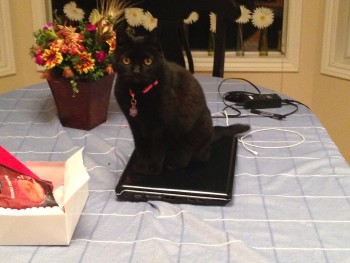

Something tells me that KC The Cat wants me to stop writing.
I told her I can’t because I am in editing hell, but she used her selective listening skills and did not move off of my computer.
Cats speak in a strange language.


Hello everyone! Blogger Leslie Lindsay interviewed me recently, and I’ve added our interview here, so you all could be in on the chat, if you’d like….thanks, Leslie!
Leslie Lindsay: Reading THE LANGUAGE OF SISTERS was one of the best reading experiences I’ve had in a long time; I laughed, I cried, most of the time, I didn’t even realize I was reading. It’s that good.
Cathy, it is such a pleasure to have you today. Thanks for popping by. So, I’m reading THE LANGUAGE OF SISTERS and laughing, laughing, laughing. Sometimes my husband tells me to shut up. Affectionately. And then I start thinking, Cathy has nailed this Russian-American big family thing. First, I have to know your inspiration for this book, and then I have to know how much of it is based on your experiences?
Cathy Lamb: These are a few of the things/visions that inspired me to write The Language of Sisters:
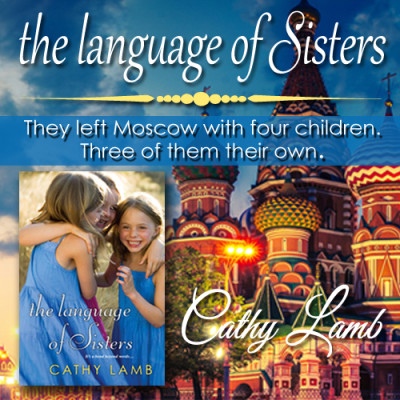
As for the book being based on my experiences? Very little. I do have two sisters, and a brother, but – so that I don’t get in trouble with them – NONE of them are in the book. I promise. I do live in Oregon, but alas, I don’t live on a tugboat in the Willamette River.
I used to write for a newspaper about homes, as Toni does. But I do not have a psychic connection with my sisters and I do not cook well at all. My children say I do not cook, I “re – heat.” Naughty children!
L.L.: I like big books…(and I cannot lie). THE LANGUAGE OF SISTERS is long. But it doesn’t feel that way. The first time I picked up the book, I read 200 pages straight through. I didn’t even fall asleep—and that’s saying a lot for me, who gets drowsy fifteen minutes after sitting down. I think what I’m trying to say is, good job on pacing. Also, good job on keeping me engaged and throwing me right into the action via media res. And here’s the question: what was your writing process like? Since it’s a longish book, did it take longer to write? Do you outline? Follow the muse?
Cathy Lamb: My writing process…well, it’s a rocky and craggy path, filled with potholes the size of Jupiter, scary looking trees, and monsters with big teeth. First, I grab a journal and start writing and sketching while drinking copious amounts of coffee and eating chocolate.
Then I grab another journal because I have filled the first one with ideas, much of them terrible, horrible ideas, and I need to figure out what the heck I’m writing about.
I start pulling characters together. I give them friends and family, and some are nice and some aren’t. I mutter and talk to myself and talk to the characters and they talk back and I proceed onward.
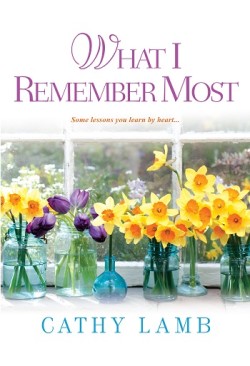 I give my heroine a job and a setting and a home. Or she’s homeless, like Grenadine Scotch Wild in WHAT I REMEMBER MOST. That gal ended up living in her car.
I give my heroine a job and a setting and a home. Or she’s homeless, like Grenadine Scotch Wild in WHAT I REMEMBER MOST. That gal ended up living in her car.
Then I talk to my wise and wonderful agent and editor and they give their input on my proposed plot, and I slug down more coffee and go for drives in the country until I can figure out the first line of the book and tell myself that, “YES. You can write another book, Cathy. You can. Cool your jets. Pipe down. Don’t lose your mind. Buck up. NO whining.”
Once the first line of the book is in my head, I write 2000 words a day, 10,000 a week until the first draft is done. If I don’t get my word count in by Saturday, I don’t go to bed.
I try to add scenes that will touch women’s hearts. They may end up laughing or crying. Hopefully they will laugh more than they cry and relate to the characters and the plot.
I do eight or nine edits of the book until the book is done and off to my agent and editor. At that point my eyes are fried, my brain is fried, and I think about moving to an old log cabin in the middle of Montana.
There are four more edits after that.
Then, it’s done. 12 edits. Out in the universe, flying around, and I don’t ever want to read it again. And, I don’t. Unless I’m at a reading.
L.L.: There are so many fabulously colorful characters in THE LANGUAGE OF SISTERS and oh my gosh, how I loved them all. Did one ‘speak’ to you first, was it your protagonist Antonia (Toni), or were they all carefully cultivated? Is there one you relate to more? By the way, I loved the parents, Alexei and Svetlana the best. Oh, and Nick!!
Cathy Lamb: I think the sisters – Toni, Valerie, and Ellie spoke the loudest to me because I related to all of them. They’re a little neurotic, intense, fierce, wild, funny, and driven because of the dangers they endured in their past in the Soviet Union.
They went skinny dipping together, sometimes drank too much, sewed gorgeous pillows, talked about life, and loved each other dearly. I could hear them in my head. It was like sitting down and talking to my own sisters, only I was invisible.
Daisy’s voice came through loud and clear for me because of how she wanted to live her life in her last years, how she insisted on staying on her houseboat, on the river, and was kind to everyone, except the bad guy, who she threw a knife at.
And I felt close to the mothers in the Kozlovsky gang, and how they felt about their kids, as a mother myself.

L.L.: I think I fell a little bit in love with that ‘man with a pistol in his pants.’ I loved him. I wanted his big, muscular arms around my shoulders. I wanted his flowers and chocolates. I wanted to spy on him with my binoculars. But I worried, too about his job as a DEA agent. Does Nick Sanchez really exist? And how can I find him? I have some single friends.
Cathy Lamb: I am so very, very sorry. I know this will crush you: No. Nick Sanchez does not exist. Except in my mind.I always try to create men that women readers will fall in love with. None of this: “Well, he’s PRETTY good, except he’s flawed like all other men.”
No.Will not do that.
I don’t want to read about a flawed man when he’s the love interest. Really. That part of a book I just want to escape into, and I think other women readers do, too.
They do not want to read about a man who refuses to do the dishes, or help with the kids because we women know what that means: We work all day and come home and do all the housework and the cooking and that is SO NOT ROMANTIC.
So, I created a man I’d want to be married to…and you got Nick Sanchez. Smoking hot and huggable forever.
L.L.: Svetlana’s Kitchen, the restaurant the Kozlovsky’s run is such a fun place. I love how Mrs. Kozlovsky names the specials after things going on in her family’s life. The food sounds delicious, too.
Cathy Lamb: So, for people who have not read THE LANGUAGE OF SISTERS: The mother, Svetlana Kozlovsky owns a restaurant. When she’s mad at her kids she writes it on the Specials Board, along with what she’s serving that night for dinner. Here’s an excerpt from the book:
Over the next few days I received a number of calls and texts from family and friends who had had my mother’s special named “My Childrens Makes Me Worry.” They wanted to know what we Kozlovsky kids did to make my mother worry. The older people who called from the Russian community also gently chastised me, in Russian, of course. “Don’t make your mama worry, Antonia. You know better.”
The regular dishes at my parents’ restaurant all have family names. “Elvira’s Tasty Treats,” which is a selection of desserts; “Valeria’s Dumplings,’ which are beef dumplings on a bed of lettuce; and “Antonia’s Delight,” which are cheese crepes.
But the specials…well, those are a crap shoot. 
In the past, my mother has named specials “Alexei Not The Boss,” after she had a fight with my father.
And “Teenagers Big Trouble” when we were younger.
And I Wish Valeria Quit Her Job.”
I had “Antonia Not A Criminal,” simply because I write about crime.
Ellie endured “Elvira’s Bad Choice” when she got engaged to Gino. It hurt Gino’s feelings.
As my sister Valerie says, “I’m a state prosecutor. I try to maintain respect, a professional image, then mama puts out a special called “Valeria No Call Mama Enough,” and even the criminals are asking me why I don’t call my mama more.”
It goes on and on. Don’t make my mother mad, or you’ll hear about it on the Tonight’s Specials board of Svetlana’s Kitchen.
L.L.: There are a lot of juicy little subplots going on in THE LANGUAGE OF SISTSERS. They are handled beautifully. My head would explode if I had the task of tying them together. Maybe yours did, too. How did you juggle so many different plot lines? Did you have a favorite?
Cathy Lamb: Honestly the sub plots were like juggling bottles of wine. Maybe that’s not the best analogy. They were like juggling cats. Eh. That one isn’t so good, either. Juggling…boxes of cookies.
I think my favorite sub plot was what happened to Dmitry in Russia. Who were his parents? How did he and the Kozlovsky family find each other? What’s the secret that the parents want buried forever? I thought that plot line was key to the whole family.
I also really liked writing about Toni’s family and all their funny and quirky imperfections. Two cousins who make fancy and frilly outfits for strippers. One who steals cars but loves opera. A sister who is engaged but really doesn’t know if she wants to get married AT ALL. A cousin with a teenage daughter who is pregnant, something so many parents go through with their own beloved children. An actress who is an extreme hypochondriac.
We all have families. Sometimes relationships can get messy/hilarious/odd/quirky.

L.L.: The Kozlovsky family endured such hardship in Moscow. At times it was hard to read, but it was done in such a tender, sensitive way. Communist Russia is something I know little about. Can you illuminate some historical significance for us?
Cathy Lamb: The history of Russia is fascinating. Honestly, read it. From the Tsar to today. It’s harsh and often horrible. Russia today is better than it was in the past, but there are still, as we all know, many problems. I used that background for my family because it was a time period I knew something about it – although I needed to learn A TON – and it was interesting to me and I hoped it would be interesting for the reader, too.
A few other things I researched? Communism. Marxism. Lenin. Stalin. The Time of Stagnation. Christians in the Soviet Union and their persecution. Social issues. Poverty in Moscow. The Russian Orthodox Church. The KGB.
L.L.: I have to ask about the title, too. THE LANGUAGE OF SISTERS is just that: a special communication the Kozlovsky sisters share in which they intuit, or ‘hear’ the voice of their sister(s) when she is in distress. It comes from the mother’s family, through the widow’s peaks of their hairline. I have a widow’s peak. So did my mother. Is there any truth to this?
Cathy Lamb: My editor thought of my title. He always titles my books because he is so much more clever about titles than I am. One time I wrote out ten titles for this book and read them to my daughters. They almost wet their pants they laughed so hard.
And no, there is zero truth about people talking to each other through their widow’s peaks. I write fiction which means I get to play.
L.L.: One last question. I think. Toni changes jobs from being a reporter of crime to writing a column about houses, “Living on a Tugboat, Talking About Homes.” How I loved these columns (which are inserted throughout the narrative). What is it about our homes (or other people’s) we are so drawn to? Why do we care? Are we all voyeuristic weirdos?
Cathy Lamb: I love looking at home magazines. I love thinking about remodeling my kitchen, making my garden better, cleaning things up, and being in my home. I think a lot of people feel the same way – especially women.
Home has a special place in everyone’s heart and there are so many people who love to relax with a magazine while looking at something beautiful or clever or curious that someone else did in their home. We get to see how other people live and that’s fun.
Plus, I was a freelance writer for The Oregonian’s Homes and Gardens for years. I loved it. I wrote about homes, décor, and design, so I gave Toni my ex – job. (I had to quit freelancing when my first book, Julia’s Chocolates, sold as I didn’t have time anymore.)
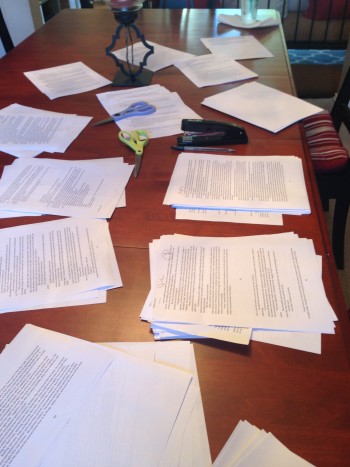
L.L.: Okay, I lied. One more question. How would you classify this book? It seems to straddle so many genres: mystery/thriller, romance, family saga/drama, women’s fiction, there’s a lot going on, but it’s so good. Does size matter? Does genre matter?
Cathy Lamb: It’s women’s fiction. I think genre matters in terms of marketing. I have a niche, it’s women’s fiction. I don’t even pretend to write for men. My books aren’t for men. I think people read what they are interested in reading and the genre doesn’t matter.
As for size of the book? Eh? Look at PILLARS OF THE EARTH. That novel was huge and everyone loved it. Then, there are shorter books, say by Mitch Albom, that everyone adores and they’re not very long.
To me it all has to do with plot. The plot has to be engaging and gripping and keeping the reader turning the pages. Short or long, you have to do that as a writer.

My Very Best Friend is on Kobo and Amazon for $2.99 if you need to go to Scotland in your head, repair a crumbling cottage, hang out with a man in a kilt, or make new friends who get a little wild now and then with revenge and bar fights.
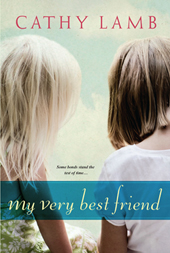

Hello everyone,
I’m handing my blog over today to my friend and fellow author, Amy Impellizzeri.
This is one of the most touching, memorable blogs I’ve read about another family member. Amy writes about her grandmother, her black and white TV, tuna melts, lipstick stained cigarettes and clinical depression. It’s a beautiful, and sad, look into someone else’s life.
(Need a book for the holidays? I’d highly recommend Amy’s Secrets of Worry Dolls.)
By Amy Impellizzeri:
My newest novel, Secrets of Worry Dolls, is about mothers and daughters. And since I am both of those things, it might be tempting to read something personal into my characters. But I have to admit that there is someone else I thought of often as I wrote this story. In fact, Secrets of Worry Dolls is dedicated to my Grandmother, Lois, In Memoriam.
“Because her legacy both haunts and inspires me daily.
And because she would have gotten a really big kick out of having a book of mine dedicated to her.”
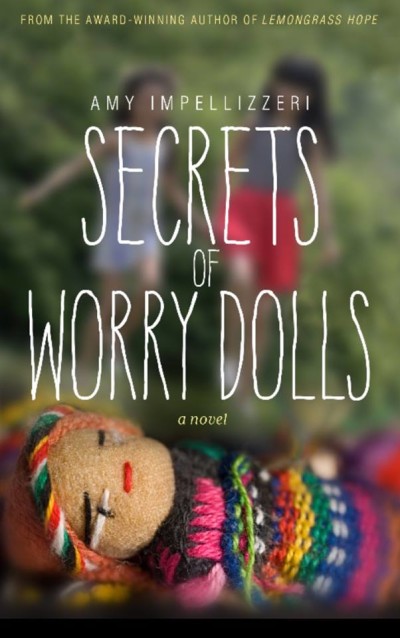
***
My earliest memories of my grandmother include the rabbit-eared television set and the overstuffed eggplant-colored sofa in her two-bedroom apartment where I used to go for sleepovers as a little girl. Bright lipstick-stained cigarette remnants piled high on a television tray table by the sofa. Coffee and milk were served in mis-matched china cups. Store-bought lemon cookies were served up as decadent desserts.
Mine was no ordinary Grandma.
When I visited her, meals were served at the local diner where my grandmother was considered a regular. Poached eggs, black coffee and unfiltered cigarettes were called breakfast. Tuna melts, black coffee and unfiltered cigarettes were called dinner. Grandma would drive us to the diner in her manual Dodge Dart and home again to watch the news on her small black and white TV. Once a year we’d watch the Miss America pageant instead of the news, relying on the broadcaster to tell us the colors of the women’s gowns. She’d let me read her Shel Silverstein collection, or browse through the rest of her library of dog-eared books. I don’t think my grandmother owned a single book she’d only read once. We’d turn in early, and I’d sleep in a thin sleeping bag on the hard floor and she’d snore loudly in her bed above me.
The older I get, the more I cling to this collage of images I want forever connected to my grandmother. They are uniquely mine, and they represent a thin sliver of time when my grandmother was – for all intents and purposes – well.
My grandmother was diagnosed with clinical depression when her two young daughters were still toddlers. I have mostly overheard details about my mother’s childhood, and have unraveled a past in which my grandmother was largely … Gone. Later, when I was born, somehow my grandmother came back into the picture – for her own version of maternal redemption in the form of Dodge Dart sleepovers.
And in those years that I knew her as a young child, my grandmother was independent. Happy even. A working, single woman with her own bank account and a reserved corner booth at the local diner. To my young eyes, she seemed quite fearless. Quite interesting. If you had asked me then, I would have told you that I wanted to be just. Like. Her.

The deterioration occurred largely in my later teen years. Remission over, the disease of her mind emerged from the shadows, swallowing her whole. The sleepovers ceased. No more driving. No more diners. Dinners out were on the hospital psych ward where she began spending more and more nights.
More overhearing. More unraveling.
And then. An unexpected diagnosis came when I was 25 years old. My grandmother had an inoperable malignant brain tumor that was going to kill her at the premature age of 66. Which meant she would never be healed of her mental illness.
Her legacy became fear. My fear of having wished to be just. Like. Her.
And truth be told, that might have been her legacy always, except for the fact that fifteen years after my grandmother’s death, my mother called me. “I have something for you. Your grandmother’s sister found something she wanted you to have. A folder. Do you want it?”
Yes. Please.
My grandmother, you see, was a writer.
***
I waited until my husband was at work and the kids were all occupied and then I sat on the middle of my bed surrounded by sheaves of paper I pulled out of the lilac-colored folder. I stared at them. Fifty-year old thin sheets – created on a typewriter before my birth, with little “x’s” over some of the letters for corrections. I rubbed my hands over the pages knowing that she had touched them. I sorted through her essays about the diner. About her sisters. Former neighbors and lovers. Letters to her favorite newspaper columnist. It was hard to focus on the words because the emotions swirled almost palpably on the pages. I found a five-page stapled essay that began with a quote from Tennessee Williams’ “The Night of the Iguana.”
“O Courage, could you not as well
Select a second place to dwell.”
My grandmother wanted to be courageous and fearless. She wrote about moving toward healing, and resolutions, and love. But her writings – like her life – ended abruptly. I couldn’t help but wish she had written a better ending for herself. A more hopeful legacy.
So I did. As I closed the lilac-colored folder, I resolved to live – and write – a more hopeful story than fear.
Yes, Secrets of Worry Dolls is about mothers and daughters. But at its core, Secrets of Worry Dolls is a story about legacies; it’s about tragedy and survival. And while I think it’s probably true that we can’t write anyone’s story but our own, I also believe that no one’s story is ever really written in stone.
Visit with Amy –
facebook: https://www.facebook.com/ImpellizzeriAmy
Website: http://www.amyimpellizzeri.com/

I am going back to bed to work.
Today is the day I start the seventh edit of my eleventh novel.
My eyes are fuzzy, I am doubting every single word I’ve written, and I can’t remember when I last washed my hair.
This is what happens when a deadline looms like a fanged, mean monster.
One would think that after writing ten novels this would get easier.
It does not.
One would think that I would have this writing stuff down, understood, memorized.
I don’t.
One would think that I could toss an imaginary character into the universe, with a twirl and a swirl, and a story would emerge like magic, with cool characters and a throat gripping plot line, and I’d slug down coffee, fill in the blanks and that would be that.
Tra la la.
Never. That has never happened.
In fact, in some ways it’s gotten harder to write books over the years.
It’s a brain boggler (I think I just made that phrase up) to try to think up new characters, issues and sub plots, structures and themes, that are completely different from what you’ve written before.
It’s like trying to pull out your molars with a toothpick.
It’s like trying to stand on your head while tap dancing.
It’s like trying to do a back flip through sludge.
Which is why I’m going back to bed.
To edit. Slash. Delete. Write. Repeat.
I may well lose my mind. My brain might drain out of my head.
Wishing you a happy day from bed.


Need a Christmas story with a happy ending? Want to escape to Montana for a little romance?
Do you need a laugh?
I have two short stories waiting for you by the fire, written especially for all the elves out there who require some Christmas magic and wine/scotch to get through the holidays.
A Very Merry Christmas is on Santa’s List for $2.99 on kindle.
https://www.amazon.com/Very-Merry-Christmas-Cathy-Lamb-ebook/dp/B01DRXCGPS/ref=sr_1_1?ie=UTF8&qid=1480319274&sr=8-1&keywords=cathy+lamb+a+very+merry+christmas
(This short story was in Holiday Magic years ago.)
Christmas in Montana, in the Our First Christmas anthology, is only $5.99. Mrs. Claus put it on sale.
https://www.amazon.com/Our-First-Christmas-Lisa-Jackson-ebook/dp/B01A4ANVTM/ref=sr_1_1?ie=UTF8&qid=1480317028&sr=8-1&keywords=cathy+lamb+our+first+christmas
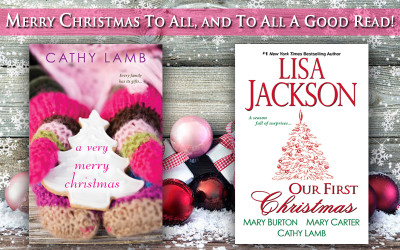

Once again, my magnificent cooking skills are on display as I hop into the kitchen and cook my dear family a turkey.
Happy Thanksgiving, everyone!
(And yes, all three of our fire alarms went off.)
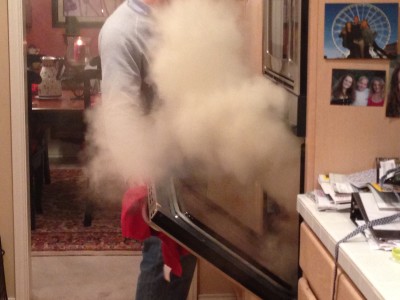

Happy, happy Thanksgiving, everyone. Wishing you a holiday filled with fun relatives and excellent food.
If there is neither, then I am wishing you wine. Or pumpkin pie with a smiley face.
Cheers.


If you need a book to get you through the relatives and teeth grinding political talk over the turkey…”Henry’s Sisters” is less than $5 on kindle and mass market paperback and “The Last Time I Was Me” is less than $7 on kindle and mass market paperback.
One character waters her cheating ex husband’s Corvette, the other one participates in anger management class and buries a body.
Pass the stuffing.
AMAZON:https://www.amazon.com/s/ref=nb_sb_noss?url=search-alias%3Daps&field-keywords=cathy+lamb
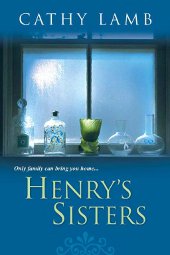
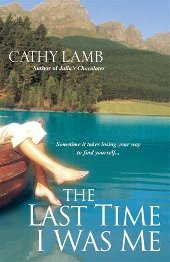

Who are your thankful for? Why?
This is my little brother, Jimmy.
He is the one I dedicated “The Language of Sisters” to.
I bought him this monster cake for his birthday because I knew it would make him laugh. (He didn’t want his photo on facebook!)
Jimmy is Wendi’s husband and Noah’s father. He was in the Army Reserves for eight years. He was a professional sky diver. He’s a firefighter and a paramedic.
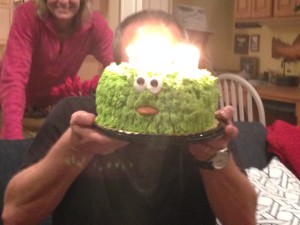
Jimmy spends every day at work helping other people. It’s what his whole professional life is about. He comes in on what will be, for many of them, the worst, or one of the worst, days of their lives. He’s calm, he’s competent, he’s experienced.
He gets some pretty hard calls, as you can imagine. Terrible situations. Crying and chaos. Fire and smoke. Accidents, heart attacks, burns, deaths, blood, diseases, the ravages of people on drugs.
And he helps. He fixes. He solves. He comforts.
He and his family have always been there for me and my family, during good times and very bad times. I know they always will be.
Jimmy makes me laugh. He makes scrumptious food, especially his cinnamon monkey bread, which he brings for Thanksgiving at my house every year. It is our tradition to eat the monkey bread as an appetizer. It is odd, we know this, we do.
My brother is one of the best, most loyal friends of my life.
And that’s why “The Language of Sisters” – there’s a wonderful brother in there! – is for him.
It’s a little thank you for being an outstanding little brother.

Cathy Lamb All rights reserved © 2011-2025 |
 |